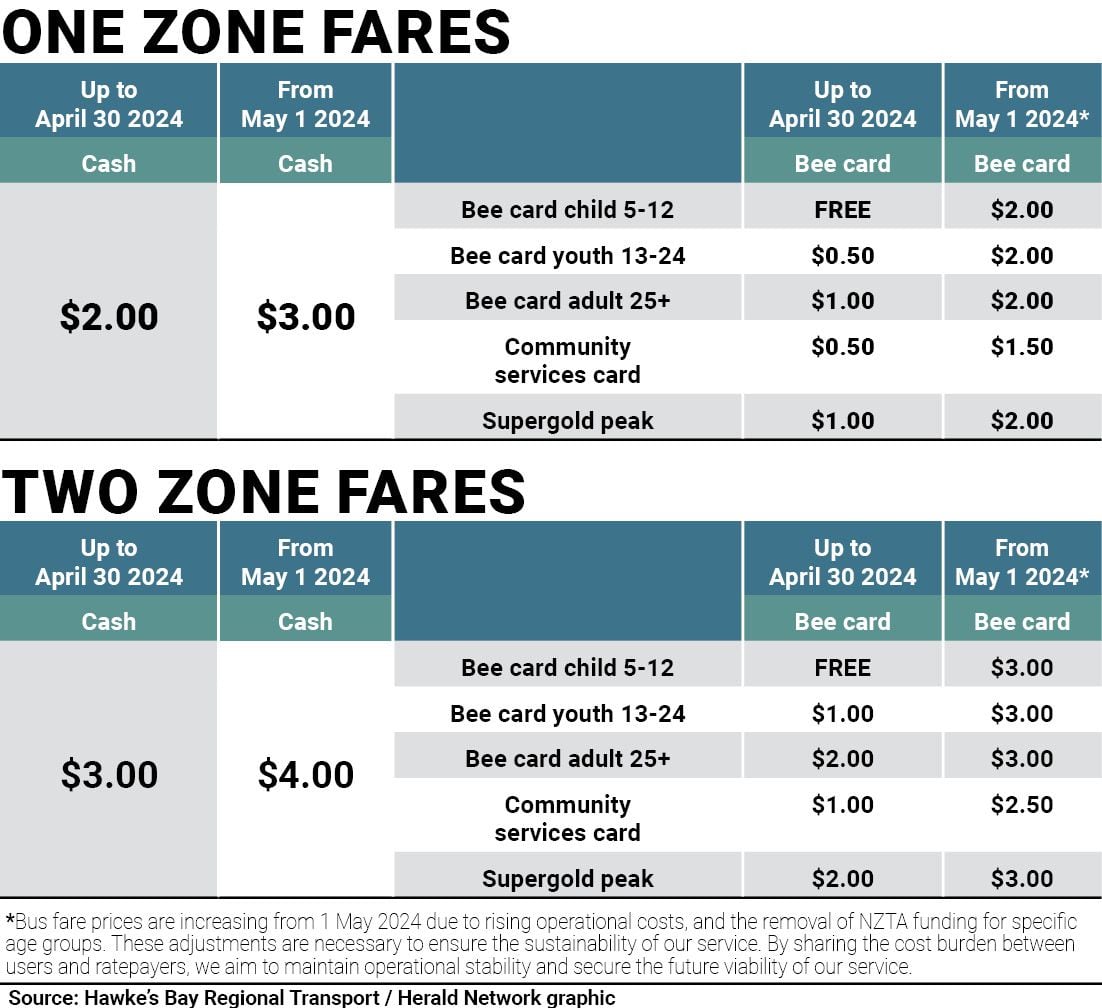Parents face paying up to six times more for children’s school bus fares under a pending increase.
Children and pensioners will pay the same as adults, and all prices will increase from May 1 under a Hawke’s Bay Regional Council proposal announced earlier this year.
One-zone trips, within Napier or Hastings, and all Bee Card fares will increase to $2, except for the Community Service Card fare which increases from $0.50 to $1.50.
The Bee Card is a pre-paid tag-on tag-off fare card.
For two-zone trips, between Napier and Hastings, Bee Card fares rise to $3, except for Community Service Card holders which go from $1 to $2.50.
Justification for the increases are “rising operational costs and the removal of NZTA funding for specific age groups”.
Melanie Marsh will go from paying $40 per month to $120 per month for her son's bus fares. Photo / Paul Taylor
The National-led coalition Government recently announced it will slash the public transport budget, including cuts to council subsidies for public transport services.
Labour had promised up to $2.8b in subsidies over the next three years, while the new Government plans to cut it to $2.3b.
Hastings resident Melanie Marsh sends her son Lachlan to school in Napier. The cost of his commute will increase from $40 a month to $120 a month.
“I am a single mother, money is tight with the cost of living so to add this cost is going to be difficult,” Marsh said.
“We used to live in Napier and my son is autistic, so moving schools isn’t that easy. We would have to pay for a whole new uniform on top of the other costs involved with changing schools.”
 Children and pensioners will pay the same as adults when fares go up on May 1.
Children and pensioners will pay the same as adults when fares go up on May 1.
Marsh said she did not understand why public transport funding would be cut for youth, in particular those who needed it to get to school.
“I was definitely unhappy when I found out about it. I rang GoBay bus to find out how much and I also rang WINZ [Work and Income] to see if there was any help available,” she said.
“I hope National rethink this as soon as possible.”

Napier resident Karl Goodchild said the cost of sending his two sons to school at Lindisfarne College in Hastings will increase six-fold from $10 to $60 per week, or $380 to $2200 annually.
Goodchild said he understood the funding cuts and some price increases were needed, but he believed the student fare should remain cheaper.
“It is very disappointing for us, that we are probably going to look at driving across to Hastings as often as possible, because it is probably more affordable for us to do that in a small vehicle than it is for us to take the buses,” Goodchild said.
“This puts more cars on the road when the whole point of buses in the system is to reduce traffic, not increase it, and there are the environmental factors as well.”
Regional councillor Martin Williams, the Regional Transport Committee chair, said he believed in keeping public transport accessible to the public.
However, the need to increase bus fares remained due to reduced subsidies, a 30 per cent increase in the Regional Council’s contract price to GoBus and their responsibility to pay bus drivers a living wage.
“Every dollar that a patron doesn’t pay getting on the bus ultimately falls on the ratepayer or the taxpayer, and the ratepayers are screaming at us: ‘Stop putting up rates’.
“So it has got to come from somewhere and less of it is coming from Wellington,” Williams said.
Williams said he was talking to council staff to see if there could be a student or youth rate, but it was a work in progress.
He was also seeking advice on how fares align with Gold Card entitlements.
Napier MP Katie Nimon said setting bus fares was an internal decision for the regional council, but noted that NZTA already subsided “around 50 per cent” of bus fares.
Nimon - a former regional council transport manager - said locals who felt strongly about the price or fare structures should submit their thoughts to the council.
She said the Government strongly believed in funding public transport.
However, the priority was economic productivity and value for money with transport projects in the draft Government Policy Statement on Land Transport, recently released by Transport Minister Simeon Brown
“There was a 71 per cent increase in Government funding for public transport over the last five years but patronage had decreased by 23 per cent,” Nimon said.
James Pocock joined Hawke’s Bay Today in 2021 and writes breaking news and features, with a focus on environment, local government and post-cyclone issues in the region. He has a keen interest in finding the bigger picture in research and making it more accessible to audiences. He lives in Napier. [email protected]
Take your Radio, Podcasts and Music with you









